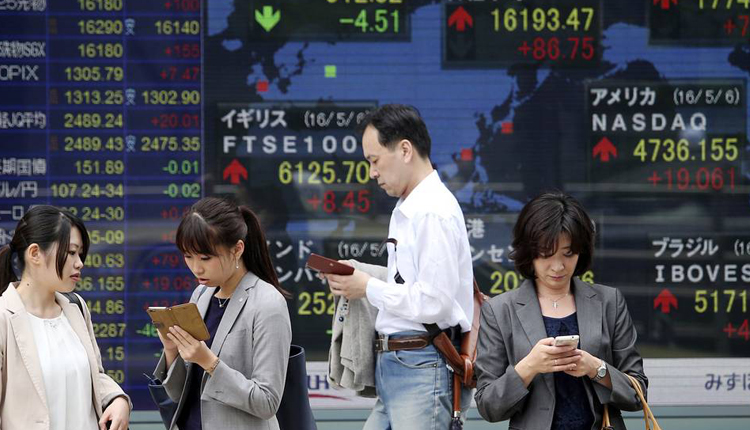Asian stocks traded down on Thursday afternoon, with Indonesia’s benchmark index bucking the trend as stocks jumped on election hopes. Meanwhile, investors looked to signs of progress in U.S.-China trade talks.
In Japan, the Nikkei 225 slipped 0.62 percent, with shares of conglomerate Softbank Group declining more than 2 percent. The Topix index also traded lower by 0.63 percent.
Mainland Chinese shares declined by the afternoon, with the Shanghai composite slipping 0.23 percent and the Shenzhen component lower by about 0.34 percent. The Shenzhen composite also declined 0.261 percent.
The Hang Seng index in Hong Kong also shed 0.6 percent as Hong Kong-listed shares of China Construction Bank declined more than 1.6 percent.
South Korea’s Kospi declined 1.01 percent. Industry heavyweight Samsung Electronics saw its stock drop more than 2 percent after multiple accounts emerged of its $2,000 folding phone breaking for several users ahead of the device’s retail launch.
Elsewhere in the region, Indonesia’s Jakarta Composite index jumped 1.55 percent at the open, according to Reuters. The moves came after privates polls showed incumbent President Joko Widodo likely to win a second term in office as the votes from Wednesday’s election rolled in. The index last traded up by 0.7 percent.
“Early results suggest that incumbent President Jokowi may he headed for (a) second five-year term after the Indonesian elections (are) held on April 17,” strategists at DBS Group Research wrote in a note. “During his new term, we would expect stability and continuity in his polices, thus removing a major overhang for the market.”
In Australia, the ASX 200 was largely flat as the sectors traded mixed.
Australian labor force data came in above expectations on Thursday, with 25,700 jobs added on a seasonally adjusted basis in the month of March as compared to a forecast gain of 12,000 in a Reuters poll.
Following the release of that data, the Australian dollar spiked to $0.7199 before last trading at $0.7176.
“The Australian labour market data is crucial for the outlook for the Australian economy, Australian interest rates and the direction of AUD/USD. The RBA has nominated the labour market data as the key guide to their monetary policy outlook,” Richard Grace, chief currency strategist and head of international economics at Commonwealth Bank of Australia, wrote in a morning note.
“Although a stronger than expected Australian labour market result will push AUD higher, participants may be still positioned to sell AUD into rallies because of the medium‑term risk of RBA rate cuts,” Grace said.
Amid the ongoing earnings season stateside, 84.6 percent of the S&P 500 companies that have reported calendar first-quarter earnings have topped analyst expectations, according to FactSet. This was a highly anticipated earnings season as analysts polled by FactSet expected corporate earnings to have fallen by 4.2 percent in the first quarter.
On the trade front, sources told CNBC on Wednesday that Beijing officials are looking at U.S. President Donald Trump’s upcoming international travel dates that might offer potential for a summit off of American soil. Investors have been watching out for any developments that the two economic powerhouses could be close to reaching a deal to end a protracted trade war.
The U.S. dollar index, which tracks the greenback against a basket of its peers, was at 97.020 after slipping from the 97.1 handle yesterday. The Japanese yen traded at 111.90 against the dollar after touching a low of 112.07 earlier.
Oil prices were mixed in the afternoon of Asian trading hours, with the international benchmark Brent crude futures contract largely flat at $71.61 per barrel and U.S. crude futures marginally higher at $63.79 per barrel.
Source: CNBC


